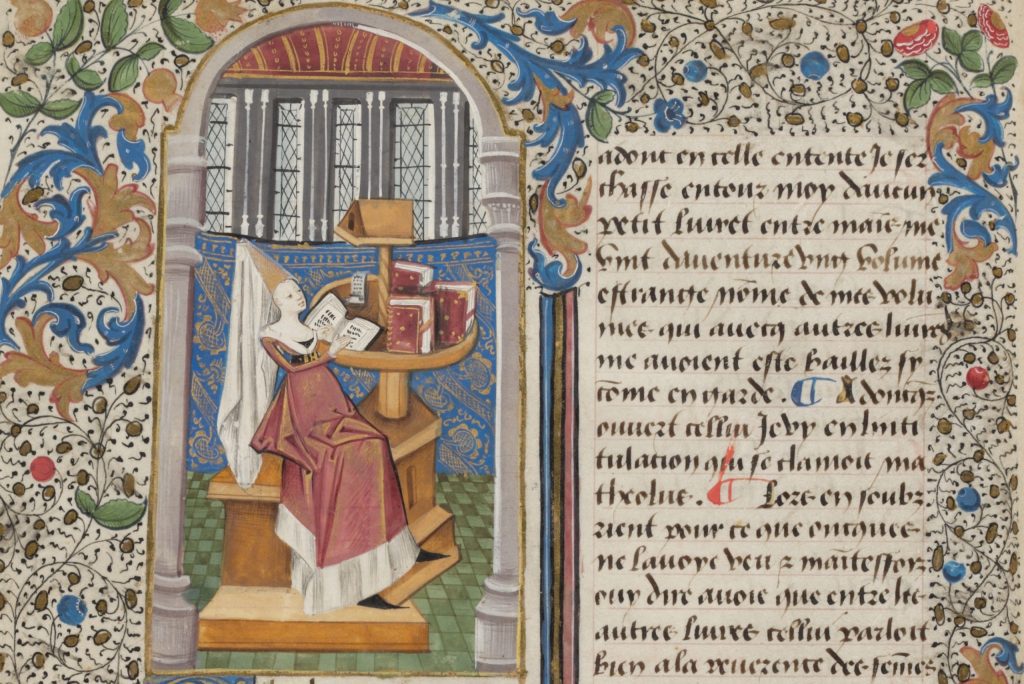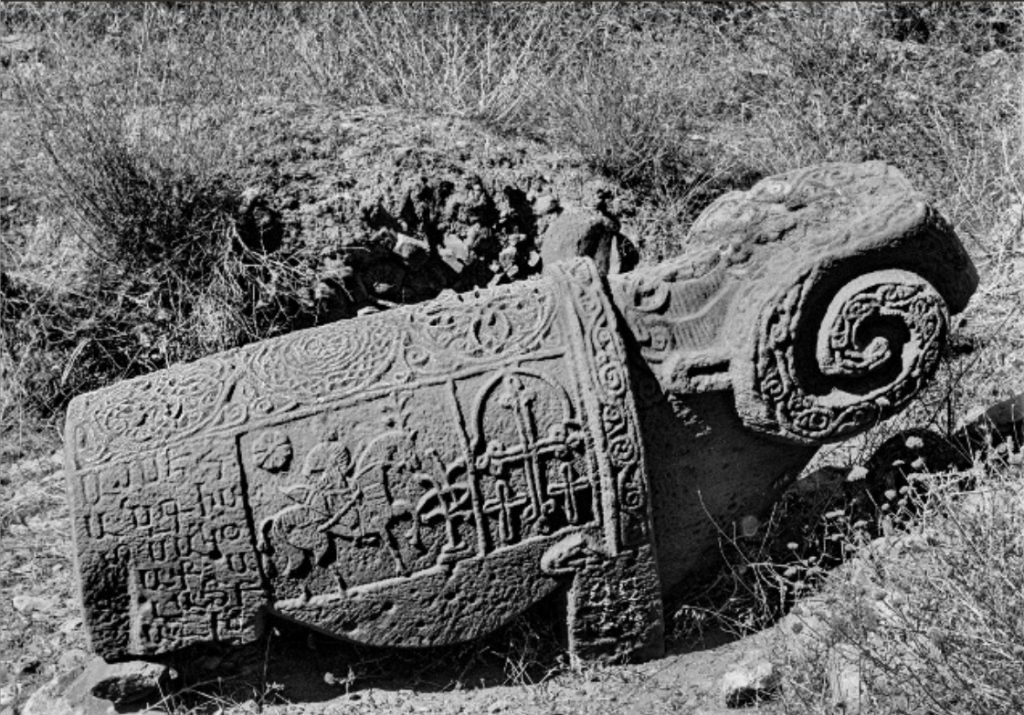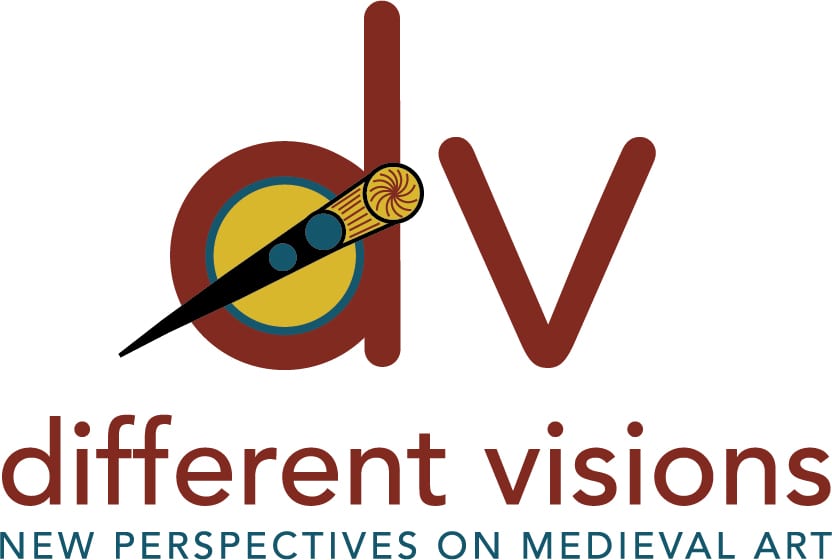What should we be reading? What should we be looking at?
Please join us to imagine the future of Medieval Art History at the 60th International Congress on Medieval Studies (Kalamazoo, MI), May 8-10, 2025 IN PERSON at Western Michigan University.
Session 1: Medieval Art History Tomorrow: A Whiteboard Session
Session 2: Medieval Art History Tomorrow: A Lightening Session
Organized by Ben Tilghman, Eliza Garrison, and Nina Rowe and Sponsored by Different Visions
Session 1: Medieval Art History Tomorrow: A Whiteboard Session

Christine de Pizan in her study, from The Book of the City of Ladies, f 3v, Ms. Fr. 180, Bibliothèque de Genève. CC BY-NC.
It worked so well in 2024, we’re doing it again in 2025!
The field of medieval art history is in a moment of expansion and self-evaluation. Humanities-wide initiatives aimed at inclusion and the impulse to reckon with colonial legacies and environmental degradation have ignited scholars of medieval art to ask new questions of canonical objects and to expand the canon of the field beyond the bounds of Western Europe and Byzantium. Theoretical texts from discourses outside art history – discussions informed by anti-racist principles, environmental studies, and queer theory, among others – ground such inquiries and link the work of medievalists to the priorities of colleagues across the liberal arts.
Inspired by the success of the session we organized at the ICMS in 2024, we will hold a redux in 2025. Our goal is to further inspire and work with emerging and established scholars, expanding exposure to critical theory outside the discipline of art history and steering our field toward ethically informed and socially engaged scholarship with stakes for the humanities broadly conceived.
What we Envision:
- Our guiding question is: “What should we be reading?”
- In the coming months: We will select three Workshop Leaders to guide discussion, working collaboratively with the three session organizers (Ben, Eliza, and Nina).
- In early spring 2025: via public postings and email to registered attendees, we will pre-circulate materials from each Workshop Leader. These materials will include a short critical text excerpt, along with an explanation of a site or object that might benefit from collaborative investigation that will be guided by the theoretical issues explored in the text excerpt.
- At the ICMS: Each Workshop Leader will provide a brief summary of the text and explain why they think it could fruitfully inspire analysis of a chosen object or site, and/or the field of medieval art history in general.
- Ground Rules for the ICMS Workshop:
-
- We will encourage broad and open conversation about the texts and sites and will map next steps for a collaborative investigation inspired by the discussion.
- This is a brainstorming session: no idea is dumb. Together, we will work towards bold and creative new ways of approaching our objects of study.
CFP – If you want to be a Workshop Leader:
In this brainstorming session, three Workshop Leaders each will give a very short (4-5 minute) presentation on a critical text from outside the field of art history and an object or site, making the case for how these materials can steer and energize the field of medieval art history going forward. Following the presentations, Workshop Leaders will orchestrate break-out small group discussions on themes of their presentations. We are especially interested in presentations that address theoretical texts from the discourses of anti-racist practice, postcolonialism, environmental studies, queer theory, and other fields that can steer ethically-informed scholarship.
Because our session is designated as a Workshop, we will constitute our panel outside the Confex submission system used by the ICMS. So here are particulars if you wish to submit a proposal to be a Workshop Leader:
Proposals should include:
- PDF of the critical text that will be presented and discussed (no more than 10 published pages)
- An abstract that (a) explains how you think the text you selected has the potential to steer the field of medieval art history in productive ways and (b) identifies a particular object or site that is suited to collaborative inquiry informed by your text and socially-engaged practices
- A current CV
Deadline: Sunday, September 15, 2024, 11:59pm ET
Send materials and any questions to: medievalarthistorytomorrow@gmail.com
In the interest of formulating a coherent and dynamic panel, those who submit proposals should expect discussion with the workshop organizers and refinement of plans for the presentations in advance of the ICMS 2025.
Session 2: Medieval Art History Tomorrow: A Lightning Session

Tombstone in the shape of a ram, Armenian, 10th-15th century, Julfa Cemetery, present-day Azerbijan (destroyed ca. 2005)
Let’s work together to expand the canon of medieval art history!
The field of medieval art history is in a moment of expansion and self-evaluation. The aim of this Lightning Session is to expand the canon of medieval art works and structures taught in art history courses and considered by scholars. We will select seven speakers, each of whom will make a four-minute presentation on an image or site that is not well-known in the field and which has the potential to spark new insights and steer inquiries toward an art history informed by principles of anti-racism, critique of colonialism, and environmental and social justice. We are particularly eager to hear from colleagues who can introduce material that expands the canon of medieval art history beyond the bounds of Western Europe and Byzantium.
CFP
- Our guiding question is: “What should we be looking at?”
- Let’s put your faves on high rotation! Do you have go-to objects that you consider to be crucial for the teaching of medieval art history, but of which your colleagues are unaware? That is, if you could expand the canon of medieval art history, is there a “sleeper” that should be moved to the category of “blockbuster”? In the past decade or so, medieval art historians have eagerly overhauled course syllabi to encompass material beyond western Europe and the Byzantine heartland. But we have much to learn from our colleagues with specialized research knowledge outside traditional bounds of medieval Christian Europe.
- We invite proposals for a Lightning Session in which seven speakers will make brief (4-minute) presentations on a lesser-known object or site as a means to share information and spark broader discussions about pedagogy, conceptualizations of the field, and the intersections of research, teaching, and collecting/display.
We will constitute our panel outside the Confex submission system used by the ICMS. So here are particulars if you wish to submit a proposal to be a Workshop Leader:
Proposal should include:
- An abstract that (a) gives a brief description of your object or site, highlighting the surprising aspects of it, (b) explains how you think your object or site has the potential to steer the teaching of medieval art history in productive ways
- A current CV
Deadline: Sunday, September 15, 2024, 11:59pm ET
Send materials and any questions to: medievalarthistorytomorrow@gmail.com
In the interest of formulating a coherent and dynamic panel, those who submit proposals should expect discussion with the workshop organizers and refinement of plans for the presentations in advance of ICMS 2025.
